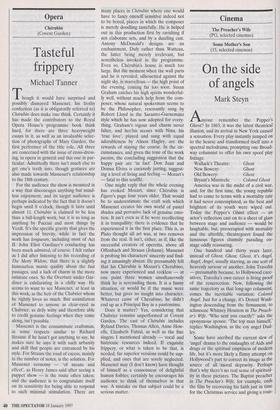Opera
Cherubin (Covent Garden)
Tasteful frippery
Michael Tanner
Though it would have surprised and possibly dismayed Massenet, his frothy confection (as it is obligatorily referred to) Cherubin does make one think. Certainly it has made the contributors to the Royal Opera House's programme book think hard, for there are three heavyweight essays in it, as well as an invaluable selec- tion of photographs of Mary Garden, the first performer of the title role. All three are concerned with the issue of cross-dress- ing, in opera in general and this one in par- ticular. Admittedly there isn't much else to get one's teeth into, though gestures are also made towards Massenet's relationship to the 18th century.
For the audience the show is mounted in a way that discourages anything but mind- less enjoyment, and its target audience is perhaps indicated by the fact that it doesn't begin until 8 o'clock, though it lasts until almost 11. Cherubin is claimed to be less than a full-length work, but it is as long as anything by Puccini and most things by Verdi. It's the specific gravity that gives the impression of brevity, while in fact the work has longueurs, including most of Act II. John Eliot Gardiner's conducting has been much admired, of course. I felt rather as I did after listening to his recording of The Meny Widow, that there is a slightly humourless manic quality about the fast passages, and a lack of charm in the more intimate ones. So the Overture under Gar- diner is exhilarating in a chilly way. He seems to want to see Massenet, at least in this work, as the heir of the Chabrier whom he rightly loves so much. But assimilation of Massenet to anyone as clear-eyed as Chabrier, as drily witty and therefore able to credit genuine feelings when they come along, isn't possible.
Massenet is the consummate craftsman, in some respects similar to Richard Strauss: if he hasn't got anything to say, he makes sure he says it with such urbanity and skill that people are entranced by his style. For Strauss the road of excess, mainly in the number of notes, is the solution. For Massenet economy — 'of means and effect', as Henry James said after seeing a puppet show — is the route often taken; and the audience is to congratulate itself on its sensitivity for being able to respond to such minimal stimulation. There are many places in Cherubin where one would have to fancy oneself sensitive indeed not to be bored, places in which the composer is merely doodling tastefully. He is helped out in this production first by ravishing if not elaborate sets, and by a dazzling cast. Antony McDonald's designs are an enchantment, Dufy rather than Watteau, the latter being merely irrelevant, but nonetheless invoked in the programme. Even so, Cherubin's house is much too large. But the moment when the wall parts and he is revealed, silhouetted against the night sky, is marvellous — the high point of the evening, coming far too soon. Susan Graham catches his high spirits wonderful- ly well, without much help from the com- poser, whose natural spokesman seems to be the Philosopher, resonantly sung by Robert Lloyd in the Sarastro-Gurnemanz style which he has now adopted for every- thing. Graham's vigour and charm never falter, and her/his scenes with Nina, his `true love', played and sung with equal adorableness by Alison Hagley, are the rewards of staying the course. In the cir- cumstances, and given the tone of the work passim, the concluding suggestion that the happy pair are 'in fact' Don Juan and Donna Elvira is curiously jarring, suggest- ing a level of living and feeling — Mozart's — fatal to this soufflé.
One might reply that the whole evening has evoked Mozart, since Cherubin is Figaro's page four years older. Thgt would be to underestimate the craft with which Massenet creates his own world of pastel shades and pervasive lack of genuine emo- tion. It isn't even as if he were recollecting it in tranquillity; there is evidence that he experienced it in the first place. This is, as Plato thought all art was, at two removes from the real. It isn't, either, as if, like the successful creators of operetta, above all Offenbach and Strauss (Johann), Massenet is probing his characters' sincerity and find- ing it amusingly absent. He presumably felt that his Cherubin is Mozart's Cherubino, now more experienced and reckless — at one point three women simultaneously think he is serenading them. It is a funny situation, or would be if the music were better, but gives no insight into character. Whatever came of Cherubino, he didn't end up as a Principal Boy in a pantomime.
Does it matter? Yes, considering that Chabrier remains unperformed at Covent Garden. The cast of Cherubin includes Ryland Davies, Thomas Allen, Anne How- ells, Elizabeth Futral, as well as the fine singers I mentioned already — vocal and histrionic resources indeed. If exquisite frippery, or what is taken to be that, is needed, far superior versions could be sup- plied, and ones that are sorely neglected. Massenet may (I don't know) have thought of himself as a connoisseur of delightful human foibles; certainly he encourages his audience to think of themselves in that way. A mistake on that subject could be a serious matter.


























































 Previous page
Previous page